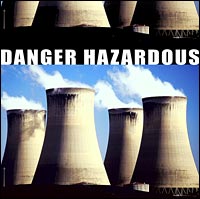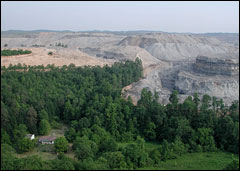Climate Climate & Energy
All Stories
-
Party at Jim’s House!
Idaho governor says no to coal, yes to whoopin’ it up Exhibiting the flair and confidence only a short-timer can afford, Idaho Gov. Jim Risch (R) has announced that the state don’t need no stinkin’ coal. Risch, who took office when Dirk Kempthorne resigned in May to head the Interior Department, will step down when […]
-
Sheet Happens … Faster
Greenland melting faster than five years ago, study says We hate to give you bad news without some good, so here goes. The bad news from a study published this week in Science is that, by comparing satellite data from 2002-2005 to earlier data, researchers have determined that Greenland’s ice sheet is melting about three […]
-
So Much For “Beyond Petroleum”
BP pipeline fubar fallout continues Oil giant BP is weathering a ginormous poopstorm over its discovery of severe corrosion in an Alaskan oil pipeline and subsequent announcement that it would shut down its entire Prudhoe Bay oil field — 8 percent of total U.S. production — while it repaired the damage, which could take until […]
-
Sardar Superstar
India dam project still hot issue after more than 20 years For citizens of India, debate over dams is soap-operatic. Take the saga of the country’s still-unfinished Sardar Sarovar dam. It has everything: protests, riots, hunger strikes, and long, protracted court battles. Proponents of the $7.7 billion dam on the Narmada River claim that, when […]
-
Nuclear power is complicated, dangerous, and definitely not the answer
If the media and the New York Times editorial page are any guide, nuclear power is the new green-energy option being embraced by environmentalists. This is not a new idea. The first mainstream statement of the “nuclear option” came from a 2003 report by MIT professors John Deutch and Ernest Moniz, “The Future of Nuclear […]
-
Wouldn’t Be Prudhoe
BP shuts down major Alaskan oil field; poop to hit fan Oil giant BP will temporarily shut down production at its Prudhoe Bay oil field, after “unexpectedly severe corrosion” and a small spill were discovered in an oil transit line on Sunday. That could mean trouble: the Prudhoe field represents nearly half the production from […]
-
Will Evolution Be Next?
Heat waves linked to climate change; even Pat Robertson is convinced Experts agree: damn, it’s hot! And you might as well get used to it. At the rate global temperatures are rising, blistering heat waves like the ones that have recently baked parts of the U.S. and Europe will become more frequent and severe, according […]
-
In coal country, mining is destroying cemeteries and faith
James Bowe, a lifelong resident of Whitesville, W.Va., knows the mountains around his home better than he knows himself. He’s seen friends and family buried there, and has devoted countless hours to protecting his loved ones’ resting places and the Indian burial grounds that stand alongside them. So when Bowe pulled up on his four-wheeler […]
-
Vail Hails Gales
Vail Resorts to be second-biggest corporate wind-power buyer in U.S. Colorado-based ski-resort company (and one-time eco-vandal target) Vail Resorts announced this week that it will buy enough wind power to offset all of the electricity it uses at its five ski areas, as well as in its corporate offices and stores. The company’s promise to […]
-
Geothermal energy
In yesterday's MIT Technology Review there's an interview with Jefferson Tester, who claims that geothermal power is a potential game-changer in the energy world.
Technology Review: How much geothermal energy could be harvested?
Jefferson Tester: The figure for the whole world is on the order of 100 million exojoules or quads [a quad is one quadrillion BTUs]. This is the part that would be useable. We now use worldwide just over 400 exojoules per year. So you do the math, and you know you've got a very big source of energy.
How much of that massive resource base could we usefully extract? Imagine that only a fraction of a percent comes out. It's still big. A tenth of a percent is 100,000 quads. You have access to a tremendous amount of stored energy. And assessment studies have shown that this is thousands of times in excess of the amount of energy we consume per-year in the country. The trick is to get it out of the ground economically and efficiently and to do it in an environmentally sustainable manner. That's what a lot of the field efforts have focused on.The idea is to break up super-hot rock way down in the earth, flood it with water that absorbs the heat, and bring the water back up, in effect mining the heat. Tester says the technology's been successfully demonstrated and we could have commercial-scale plants up and running within 10 to 15 years.
The advantage over other renewables is that geothermal provides steady baseload power:

